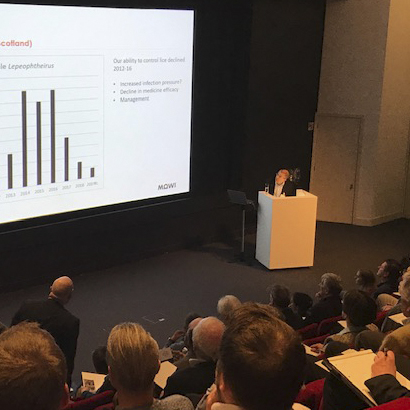‘Lice under control’ Mowi tells wild sector

SCOTLAND’S leading salmon farmer, Mowi, has ‘full control’ of sea lice on its farms, the company’s farming operations director, Gideon Pringle, told wild fisheries managers today.
Speaking at the annual Fisheries Management Scotland conference in Edinburgh, Pringle explained how a change in strategy, a new team, new thinking, new methods and new resources had reduced parasite levels to a record low in the west of Scotland.
‘As an industry, there is a reason for us to say we can get our house in order, and it is in order, at a rapid pace now, because we have very new methodologies that all work very, very well,’ he said.
The conference, whose audience was principally from the wild salmon sector, was looking at pressures on wild salmon stocks, which are now showing up to 99 per cent mortality rates at sea.
Sea lice from salmon farms have long been blamed as one of the main reasons for this decline, although scientific evidence to back up the claim is lacking.
Pringle said his company accepted there is an ‘unquantified hazard to wild fish, particularly in poorly flushed sea lochs, when levels of farm derived lice are not well managed’.
Showing graphs covering more than a decade of sea lice levels, he said that by 2015, Mowi, then Marine Harvest, ‘was really struggling to control lice’, after traditional treatments such as Slice stopped working.
‘The industry has only really ever had one, maybe two, medicines and if the whole industry is using that same medicine, year in, year out, very quickly lice become resistant….we had run out of ammunition.’
Sea lice are seen as a major threat to business and the company invested in Thermolicers, Hydrolicers, Skamic fish washers, freshwater methodologies, and cleaner fish, which all work well against lice, particularly if they are targeted very early in their development.
Mowi in Scotland has also pioneered a new way of making Salmosan work, which allowed the company to take back control while they figured out the new machines.
Mowi was the first company in Scotland to introduce the Norwegian mechanical methods of sea lice control, before they were proven, said Pringle.
‘We’re just a bunch of farmers and some of the technologies, we sometimes scratched our heads about how to make them work to their optimum,’ he said.
But they have since proved an effective tool and Mowi shares the technology with other salmon farmers in Scotland.
The industry as a whole had chosen not to be commercially competitive in this area, said Pringle, and Mowi machines are used by other companies 50 per cent of the time.
However, most businesses have now invested in the systems because ‘they won’t be able to farm without them’.
Mowi, which voluntarily published sea lice levels on its farms before the practice became industry-wide, offers ‘full transparency and justification’ of its farming methods.
These methods include the key strategy of targeting infection levels at a much lower level than previously, with thresholds set at 0.2 adult females per fish.
The point was to stop the parasite breeding, and Mowi aimed for levels even lower than this on its farms.
‘The lice find it difficult to find each other and mate and simple population metrics apply,’ said Pringle.
‘If you keep lice very, very low then the development of these populations and the number of infections also stays low.’
But he warned that despite the success of the measures used – which have achieved, since August last year, the lowest lice levels in Mowi’s fish since records began in 2007 – ‘we must not repeat the sins of the past’.
Lice show resistance very quickly to every single one of these new machines, and even to freshwater and cleaner fish.
Therefore, it is imperative that all the new control methods are used and rotated to prevent the rapid re-emergence of genetic resistance.
Pringle concluded by assuring delegates that Mowi wanted to play its part in rectifying the low investment in west coast rivers, but he added that this was a ‘shared obligation’.
Also speaking at the special salmon farming workshop at the conference was FMS chief executive Alan Wells, who said his organisation was ‘not anti-salmon farming’.
What they wanted to achieve, he said, was the right developments in the right locations. He said last year’s parliamentary inquiries into the salmon farming industry concluded that the regulatory framework was confusing and poorly coordinated.
‘Wild fish tend to fall through the cracks just about at every stage [of the regulatory system],’ he said.
FMS is working with other partners, including Mowi, to develop techniques to sample wild fish and assess impacts at a local level.
‘Ultimately, what we want to see is monitoring of wild fish, with an appropriate precautionary feedback to farm management techniques, to become a statutory responsibility at all farms.’
Wells said wild fisheries wanted adaptive management that could react to what’s happening on the ground.
‘We’re operating in a data poor environment so it’s something we’ll continually keep under scrutiny and we’ll be working hard with the sector and regulators to achieve a way forward.’

